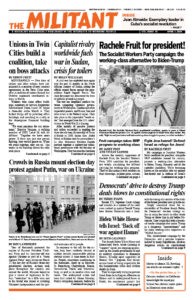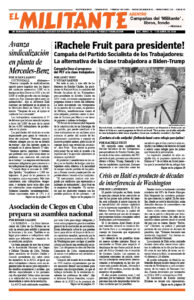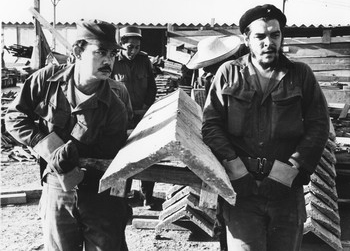One of Pathfinder’s Books of the Month for March is Che Guevara Speaks, first published within weeks of his death in combat at the hands of the CIA and U.S.-trained forces in Bolivia in 1967. Che joined the revolutionary movement led by Fidel Castro that brought Cuban workers and peasants to power in 1959, opening the socialist revolution in the Americas. This initiated a renewal of Marxism and inspired a new generation of revolutionary-minded youth worldwide. The excerpt is from “Socialism and Man in Cuba,” Guevara’s 1965 article on the road to mobilizing the working class to lead the transition from capitalism to socialism. Copyright © 2000 by Pathfinder Press. Reprinted by permission.
The new society in formation has to compete fiercely with the past. This past makes itself felt not only in the individual consciousness — in which the residue of an education systematically oriented toward isolating the individual still weighs heavily — but also through the very character of this transition period in which commodity relations still persist. The commodity is the economic cell of capitalist society. So long as it exists its effects will make themselves felt in the organization of production and, consequently, in consciousness.
Marx outlined the transition period as resulting from the explosive transformation of the capitalist system destroyed by its own contradictions. In historical reality, however, we have seen that some countries that were weak limbs on the tree of imperialism were torn off first — a phenomenon foreseen by Lenin.
In these countries capitalism had developed sufficiently to make its effects felt by the people in one way or another. But it was not capitalism’s internal contradictions that, having exhausted all possibilities, caused the system to explode. The struggle for liberation from a foreign oppressor; the misery caused by external events such as war, whose consequences privileged classes place on the backs of the exploited; liberation movements aimed at overthrowing neocolonial regimes — these are the usual factors in unleashing this kind of explosion. Conscious action does the rest.
A complete education for social labor has not yet taken place in these countries, and wealth is far from being within the reach of the masses through the simple process of appropriation. Underdevelopment, on the one hand, and the usual flight of capital, on the other, make a rapid transition without sacrifices impossible. There remains a long way to go in constructing the economic base, and the temptation is very great to follow the beaten track of material interest as the lever with which to accelerate development.
There is the danger that the forest will not be seen for the trees. The pipe dream that socialism can be achieved with the help of the dull instruments left to us by capitalism (the commodity as the economic cell, profitability, individual material interest as a lever, etc.) can lead into a blind alley. And you wind up there after having traveled a long distance with many crossroads, and it is hard to figure out just where you took the wrong turn. Meanwhile, the economic foundation that has been laid has done its work of undermining the development of consciousness. To build communism it is necessary, simultaneous with the new material foundations, to build the new man.
That is why it is very important to choose the right instrument for mobilizing the masses. Basically, this instrument must be moral in character, without neglecting, however, a correct use of the material incentive — especially of a social character.
As I have already said, in moments of great peril it is easy to muster a powerful response to moral incentives. Retaining their effect, however, requires the development of a consciousness in which there is a new scale of values. Society as a whole must be converted into a gigantic school. …
Aside from those whose lack of education makes them take the solitary road toward satisfying their own personal ambitions, there are those — even within this new panorama of a unified march forward — who have a tendency to walk separate from the masses accompanying them. What is important, however, is that each day men are acquiring ever more consciousness of the need for their incorporation into society and, at the same time, of their importance as the motor of that society.
They no longer travel completely alone over lost roads toward distant aspirations. They follow their vanguard, consisting of the party, the advanced workers, the advanced men who walk in unity with the masses and in close communion with them. The vanguards have their eyes fixed on the future and its reward, but it is not a vision of something for the individual. The prize is the new society in which men will have different characteristics: the society of communist man. …
This will be translated concretely into the reconquering of his true nature through liberated labor, and the expression of his own human condition through culture and art.
In order for him to develop in the first way, work must acquire a new status. Man-as-a-commodity ceases to exist, and a system is installed that establishes a quota for the fulfillment of his social duty. The means of production belong to society, and the machine is merely the trench where duty is fulfilled.
Man begins to free his thinking of the annoying fact that he needs to work to satisfy his animal needs. He starts to see himself reflected in his work and to understand his full stature as a human being through the object created, through the work accomplished. Work no longer entails surrendering a part of his being in the form of labor power sold, which no longer belongs to him, but represents an emanation of himself, a contribution to the common life in which he is reflected, the fulfillment of his social duty.
We are doing everything possible to give work this new status of social duty and to link it on the one side with the development of technology, which will create the conditions for greater freedom, and on the other side with voluntary work based on the Marxist appreciation that man truly reaches his full human condition when he produces without being compelled by physical necessity to sell himself as a commodity.


